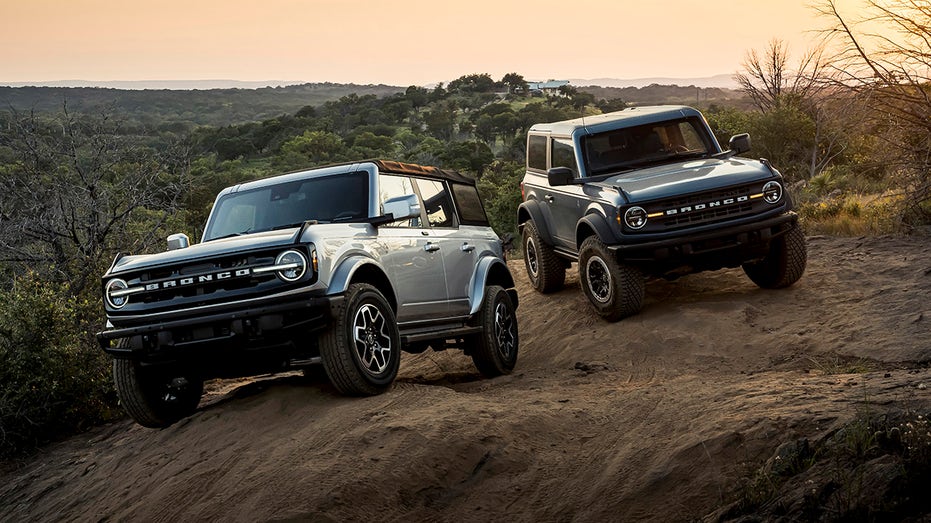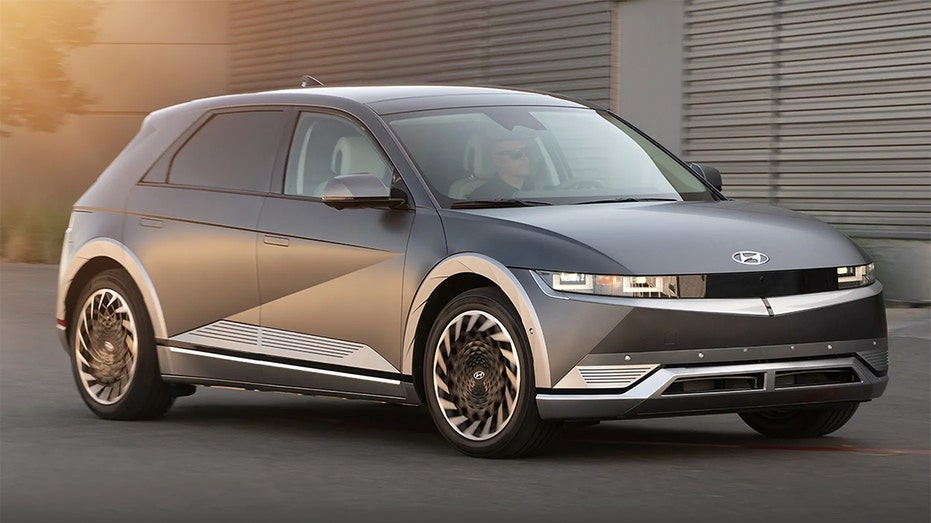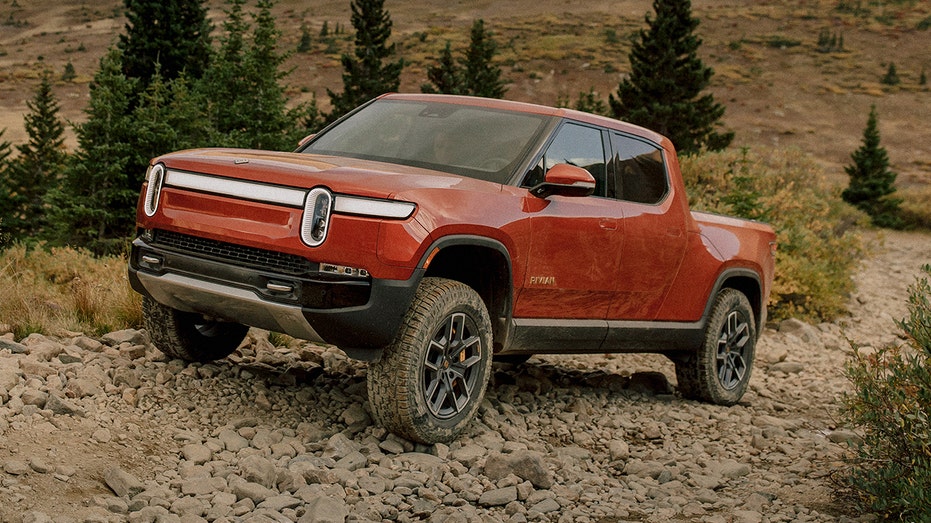With new EVs arriving, brand loyalty goes out the window
Willingness of drivers to switch opens opportunities for car companies
Which company will win the electric vehicle race?
Wedbush Securities senior equity analyst Daniel Ives provides insight on the Apple stock and electric vehicles on 'Making Money.'
As more carmakers roll out electric vehicles, they are discovering an important trait among early customers: They are far more apt to try new brands.
Nearly 80% of people who bought Kia Corporation’s EV6 electric crossover since it went on sale early this year traded in something other than a Kia, according to research site Edmunds, compared with 61% for all its models. More than two-thirds of Ford Mustang Mach-E electric sport-utility buyers had non-Ford trade-ins, compared with Ford’s 42% brand-wide average, according to the Edmunds data.
Startup truck-maker Rivian Automotive Inc. says its customers are coming from such a wide spectrum of car buyers that purchasers of its trucks and SUVs—which start around $70,000—are about as likely to own a $30,000 Subaru Outback station wagon as they are a $100,000 Porsche 911 sports car.
Those insights underscore what is at stake as traditional automakers and startups vie for early adopters in an EV market now dominated by Tesla Inc. With limited EV supplies, people who want one are shopping multiple brands.
The influx of new EV offerings is seen as one factor pressuring Tesla’s stock, which is down 69% this year and headed for its worst year ever. The EV maker’s brand image has also slid in recent months, according to surveys.
Tesla
| Ticker | Security | Last | Change | Change % |
|---|---|---|---|---|
| TSLA | TESLA INC. | 411.11 | +13.90 | +3.50% |
Car companies are racing to introduce electric cars, pressured by investor interest and toughening emissions rules. Strong demand for many early models—some with wait lists stretching beyond a year—has accelerated that push among auto executives to get their new EV models to market quickly.
"We’re seeing all kinds of trade-ins," said Beau Boeckmann, president of Los Angeles-based Galpin Motors Inc., which owns one of the biggest Ford dealerships in the U.S. "Everything from BMWs to commuter cars, even some trucks."
Still, carmakers might have a limited window to pursue EV buyers who are so eager to shop around, said Doug Betts, president of automotive at research firm J.D. Power. While an influx of new plug-in models is coming to U.S. showrooms, selection remains relatively narrow, leaving some EV buyers with little choice but to explore other brands.
"It’s a bit unnatural right now with the market not filled in," Betts said. There are 53 EV models either on the market or soon to be rolled out, according to J.D. Power, compared with 625 separate vehicle models sold overall in the U.S. in 2022.
FORD, CHINESE FIRM MAY BUILD US BATTERY PLANT: REPORT

2021 Ford Bronco 2-door Area 51 Black Diamond with available equipment, right, and 2021 Ford Bronco 4-door Iconic Silver Outer Banks with optional equipment are shown. (Photo: James Lipman / jameslipman.com)
| Ticker | Security | Last | Change | Change % |
|---|---|---|---|---|
| F | FORD MOTOR CO. | 13.80 | +0.08 | +0.58% |
| GM | GENERAL MOTORS CO. | 84.24 | +0.94 | +1.13% |
Historically, automakers have counted on customer loyalty to protect market share. On average, about half of the people who own a certain vehicle brand return to buy another one, according to research firm S&P Global Mobility.
To increase sales, automakers have long sought to attract buyers from outside their own brands. Car executives sometimes refer to so-called conquest vehicles, entries that are aimed at poaching a specific slice of a competitor’s customers. For example, when Ford released a new Bronco off-road SUV last year, many dealers said they were targeting loyal owners of the Jeep Wrangler.
General Motors Co. is counting on interest from new EV customers to boost market share as it prepares to roll out several new electrics. Executives have said they expect the influx of plug-in models to lift the popularity of GM’s brands in coastal areas, where electric-car sales are strongest but where GM historically has underperformed competitors.
EV buyers are willing to broaden their searches largely because of slim availability across the industry, said Steve Majoros, Chevrolet’s head of marketing. A traditional car buyer’s first consideration tends to be price, followed by manufacturer and model, he said. In contrast, EV buyers’ priority is purchasing an electric—their main concern is simply finding one, he said.
"The game’s changing pretty significantly," Majoros said.

Hyundai IONIQ 5 (Fox News)
| Ticker | Security | Last | Change | Change % |
|---|---|---|---|---|
| VWAPY | VOLKSWAGEN AG ADR | 11.91 | -0.04 | -0.38% |
| HYMTF | NO DATA AVAILABLE | - | - | - |
Jason Kint recently had trouble finding his EV of choice when he went shopping to replace his 10-year-old Chevrolet Volt plug-in hybrid car.
Kint, who runs a media trade organization based in New York, zeroed in on an ID.4 from Volkswagen—a brand he had owned in the past—and Kia’s EV6, after reading positive reviews. However, he had trouble finding either and ended up buying a Hyundai Ioniq 5 after a dealer in Long Island, New York called to say a sale had fallen through.
"I was definitely still partial to Volkswagen, but Hyundai just won me over. I love it," he said, adding that he could see sticking with Hyundai for his next purchase if things go well.
Upstart all-electric brands, including Rivian, Lucid Group Inc. and Fisker Inc., are positioning themselves to take advantage of EV buyers’ willingness to abandon their past car brands or vehicle body styles for something new.
AMAZON'S RIVIAN ELECTRIC VANS NOW MAKING DELIVERIES IN 100 CITIES

Rivian recently began production and deliveries of its R1T passenger pickup truck in September 2021, which starts at $67,500 and has an EPA-estimated 314 miles of range. (Rivian)
| Ticker | Security | Last | Change | Change % |
|---|---|---|---|---|
| RIVN | RIVIAN AUTOMOTIVE INC. | 14.80 | +1.07 | +7.79% |
Rivian Chief Executive RJ Scaringe said last month around half the people buying the company’s R1T pickup truck have never owned a truck. Some are coming out of small cars, station wagons, even minivans, he said.
Car companies that are able to attract early EV adopters could have a good chance at converting them into long-term customers, according to findings from J.D. Power.
Through mid-December, 64% of people who owned an EV and who bought a new vehicle stuck with the same brand, the firm found, compared with the overall industry average of about 50%.
Kia America Vice President of Marketing Russell Wager said that bodes well given Kia’s influx of EV6 buyers. Two or three years from now, he said, the company will have a larger, three-row electric SUV and hopes to upgrade some EV6 customers to that vehicle.
"That’s how we keep them," he said.
CLICK HERE TO GET THE FOX BUSINESS APP
Ford CEO Jim Farely explains what drove the automaker's investment in ICE vehicles
FOX Business correspondent Grady Trimble speaks to Ford CEO Jim Farley about the evolution of the company's electric vehicle and ICE businesses.





















